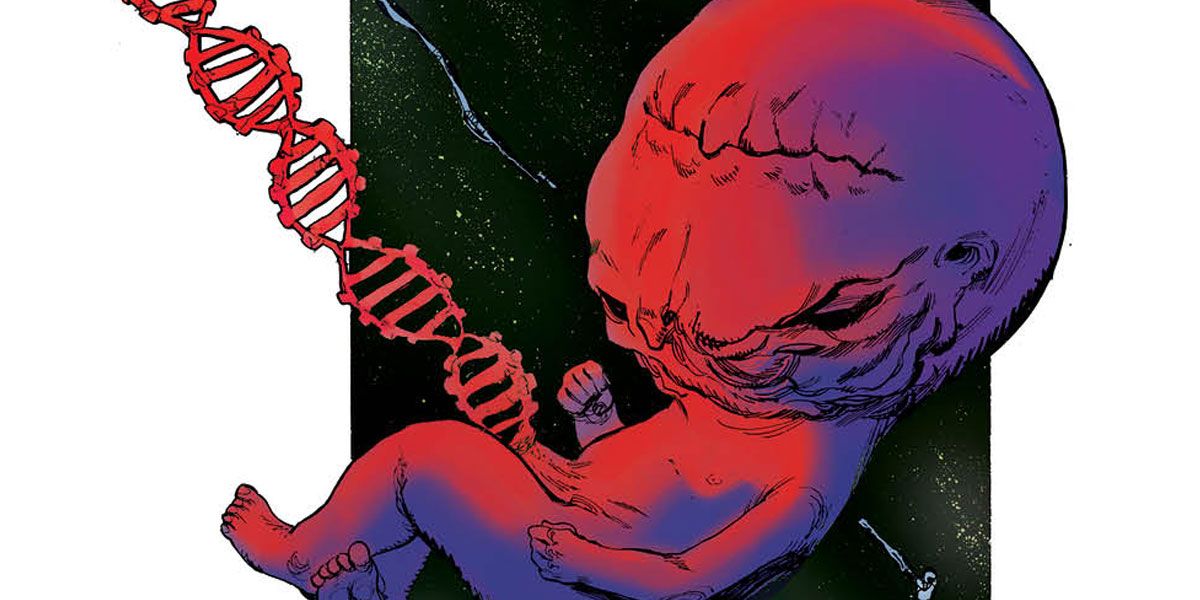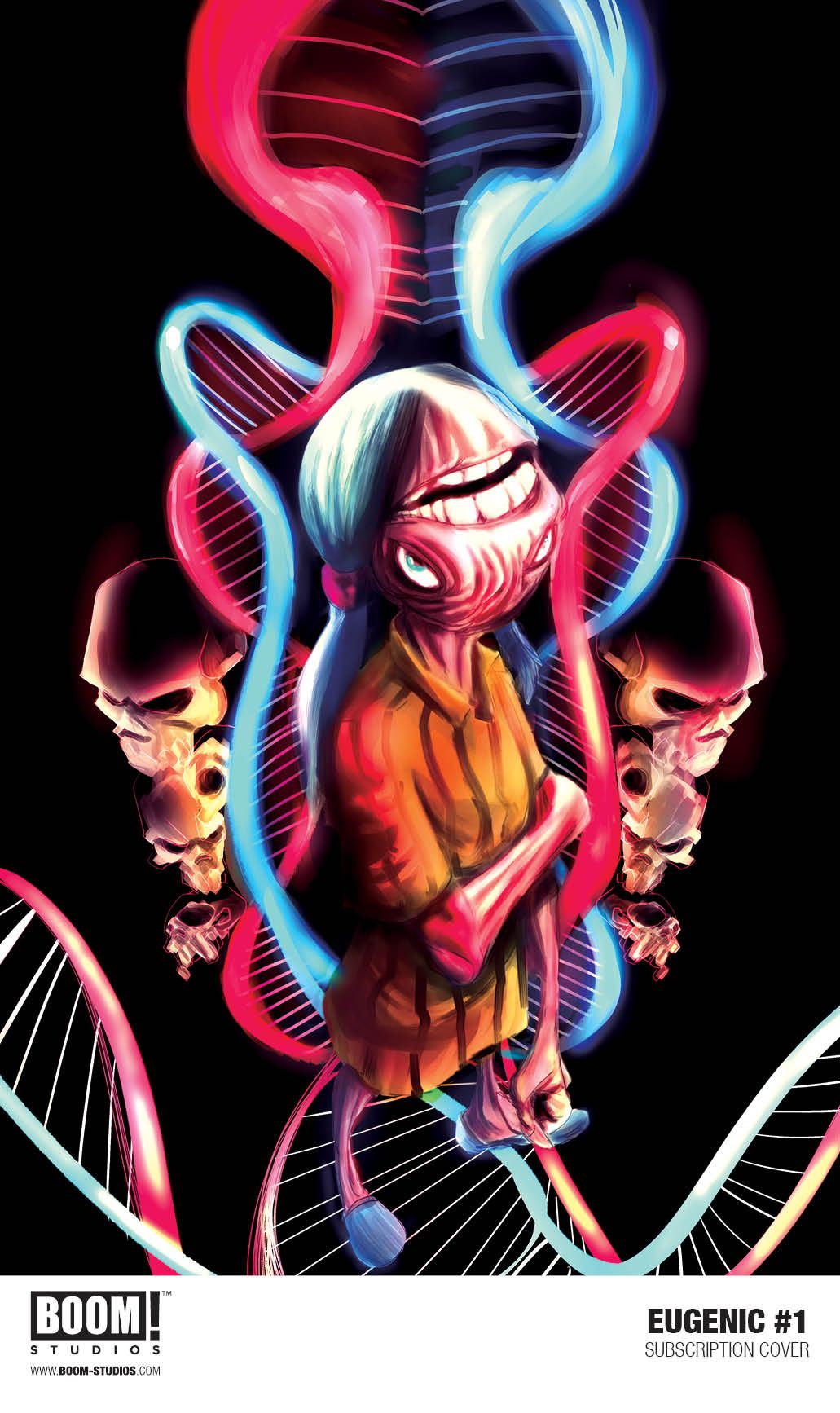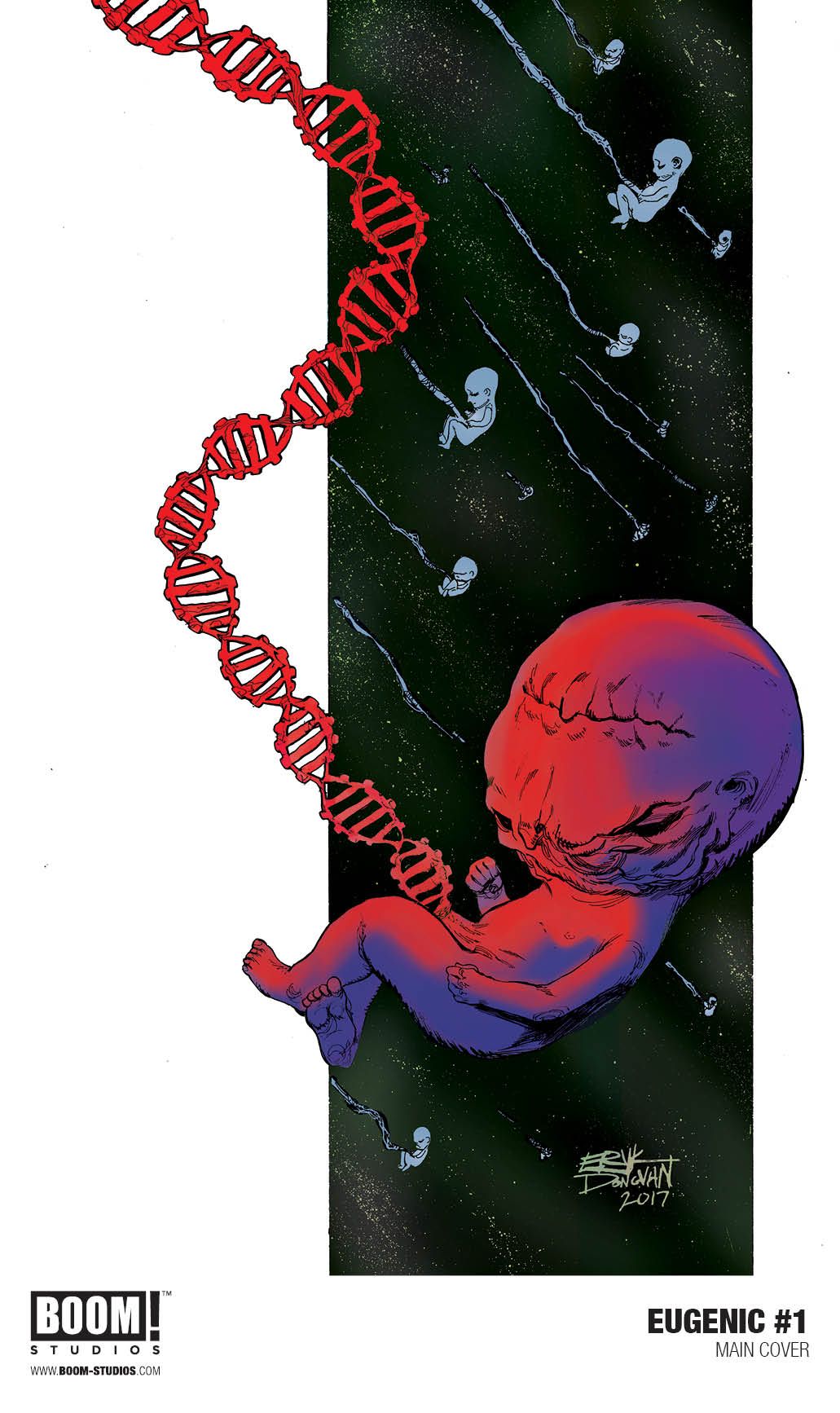James Tynion IV writes a number of titles for DC Comics, but over the past few years he’s been crafting a series of fascinating and dark horror stories at BOOM! Studios. Following Memetic and Cognetic, each of which ended the world in a novel and spectacular fashion, Tynion is back with the third and final miniseries of his Apocalyptic Trilogy: Eugenic.
Launching this fall with artist Eryk Donovan, the series involves a plague, genetic engineering and involves what Tynion called “one of the strangest things I’ve ever written.” This three issue miniseries doesn’t end the world in a matter of days like his other series, rather each issue takes place roughly two hundred after the previous one.
RELATED: INTERVIEW: Tynion Prepares Batman for War in Detective Comics
CBR: The solicit reads “When a plague ravages the world, one scientist discovers the cure and becomes the savior of mankind.” Do you want to pick things up from there and explain a little about what Eugenic is?
James Tynion IV: This story is something that’s been running around the back of my head for a long, long time. Like the solicits say, in the first issue we start in a world that’s been ravaged by this horrific plague that has impacted the entire world population. Even the people who did not directly die from it are carrying it. Beyond that, it’s affected the reproductive abilities of the human race. The majority of human births for the last 15 years have been stillbirths and humanity has started to die out. We have a character Dr. Cyrus Crane who has started to put together a plan on how to save the world – beyond just curing the virus. He has a larger agenda and that larger agenda is really what spurs on Eugenic.
It’s hard to talk about the plot of Eugenic because one of the strangest things about the conceit is that each issue takes place a few hundred years after the previous issue. They’re almost like three science fiction stand alone one shots that build on each other in a snowballing apocalypse. Both of my previous two apocalypses in this cycle have happened in a matter of days. In Memetic it happened in three days. In this one, it takes a bit longer and honestly it’s one of the strangest things I’ve ever written. That’s part of what makes it so exciting for me.
Eugenic is the third miniseries of your Apocalyptic Trilogy after Memetic and Cognetic. What ties them together for you beyond this notion of the apocalypse?
The genesis is that back in 2012 I was writing the backup stories on Batman, I was writing Talon for DC, but people only knew my work through co-writing with Scott Snyder. I didn’t have any of my own original projects out in the world and so I challenged myself to come up with the kinds of stories that I was interested in telling that I didn’t really see out there in the world. I’ve always been a horror geek. The thing that has always really struck me about horror is its power to really crack the social fears of the moment. All horror is a commentary on a certain moment in history. Even though a lot of horror is backwards looking, I started thinking about what could be forward looking and the first idea that I had was Memetic. I threw all this down into a document where in three pages I laid down what Memetic was and the rough concept of what Cognetic was and then I had a brief blurb about a eugenic apocalypse and the idea of humanity genetically engineering itself to death. It really did all start in one moment.
RELATED: Leyh, Tynion & More Discuss LGBT Characters in All-Ages Media
The thing that’s similar in all of them is a fear of sameness. There is a fear that no matter how exceptional and unique you think you are, at the end of the world you all die the same. A lot of our faults are ingrained in us from an external factor. In Memetic it’s the fact that we all have this drive to share and spread information and if all of a sudden the wrong part of that drive were triggered, we would just immediately march to our own end. In Cognetic it’s the idea that our individuality might even be a myth. That maybe we’re meant to be a giant super organism that is trying to come together and that’s why society has moved in the way it has and part of the reason we’re so unsatisfied in this moment. With Eugenic it’s a flip on it because in both of those it’s about an external force that reminds us that we’re not individually special. To live in the horror of that and then destroy the whole world. With Eugenic it is about us triggering that ourselves. If we have this deep fear of sameness, how could we actually engineer our own sameness that would lead to our end. That was the intellectual pathway that led to Eugenic.
When looking at these three books and some of your other work, I keep thinking of David Cronenberg. Is he a big creative influence?
Absolutely. One hundred per cent yes. Down to the fact that I think in talking about all of these stories the thing that’s easy for me to gloss over is the fact that all three are body horror. Because at the end of the day, it’s us being afraid of ourselves. That is always our biggest fear. The fear that we’re not good enough. The fear that we’re not smart enough. That we’re meant to be to something that we don’t want to be. In Eugenic it’s the fear of what you do with that. What do you do when you fear that we might just be wrong and broken?
How much of body horror in general and your fascination with it in particular is simply a fear of getting old and dying?
I think a lot of it. We can intellectualize so many parts of our lives, but no matter how intelligent you are, no matter how much money you have, the arc of a human life is the same. It hits similar beats along the road and then it tends to be nature or fellow man that kills you. You don’t escape the raw animal quality of humanity. I think that scares a lot of us because we see ourselves as special. We want to be special. We want to be different than a bug walking down the sidewalk, but how different are we, really? We live our lives in different ways, but we hit all of those same beats in a life cycle.
The folly of intellectualizing it is something that comes to a head in Eugenic. There’s an element of it which is that sense of being a privileged kid in college and being part of a lot of conversations with other kids who think they know how to fix the world. They know if they just did this one thing and if they had full control over the world they would be able to set everything right and just make everything perfect. The fact of the matter is that chaos catches up to you every step of the way. The fact that you want to inflict this singular version of the world upon the world would be horror in and of itself. That’s what Eugenic is all about. This scientist thinks that he can genetically engineer all of humanity at the moment it is at its weakest point to make it a better version of itself. It’s not something that the people who were hurt in the previous version of the world wanted, it was just this singular person making a singular decision that everyone else has to live with. The horror of that tearing the world apart. If any one of us had the ability to radically change the world in a single moment, I think a lot of people would take that because they think they know the answers. But at the end of the day, it doesn’t matter. The core traits of humanity power through.
The world – or genetics or nature or human nature – however you want to phrase it, always wins.
Exactly.
I think there’s a lot to be taken from Eugenic. I hope there is. That’s always the goal. To make something strange that people enjoy reading because it hits this strange spot in your soul where it feels real despite how strange it is. I think Memetic in particular hit that, where we’re seeing the end of the world because people can’t ever look away from their computers. Why was it that the second we got this tool suddenly the way humans lived changed? And so when the maker at the end of Memetic starts talking about how humans are built for this, it feels right.
BOOM! called this the Apocalyptic Trilogy which implies that these are related but the cycle is over. In part because Eugenic is so different thematically and structurally, do you see it as the end of the something? Or is this the beginning of something else?
I think that for my entire life I will tell stories that scratch the same itch that these stories scratched in me. I think that Eugenic is an ending in terms of the original concept was the horrors of homogeneity served three ways that touch on current the current state of the world. Moving forward these are themes I find deeply interesting and are themes that I think you can and will see in future stories I do. But these are three concepts that started brewing when I was five years younger than I am today and so my fears today have shifted. If I were to build a whole new apocalypse trilogy today, it would be three very different kinds of apocalypses. The end of the world is always fascinating because it feels so close and because it’s just a matter of scale. What I was saying earlier, the fact that every human life go towards death? Everything on the macro level follows the same rules as something on the micro level. That means that society will die and the world will die and the universe will die. Everything has a life cycle. Seeing that smallness, how do you act. What do you do? Those themes will be in my work forever.
I do see these as three connected but separate stories that are coming to an end here. I’m sure I’m going to work with my incredible partner on this series, Eryk Donovan. He helped on my Hellblazer run, I worked with him on a webcomic for Thrillbent, I did a short story for an anthology with him and now I’ve done three big series with him. He’s one of my closest friends in the world and we have very similar sensibilities. In terms of this format, the three oversized issue apocalypse miniseries. That format shaped the original idea. It is an ending, but there are more stories to come which if you like these takes on the world, I’ll do similar things in the future. But I want to do different things that approach these themes from wildly different angles.
Like the first two miniseries, this is three issues, right? When do they come out?
October, November, December.
So people can celebrate the end of the year with an apocalypse?
Exactly!



